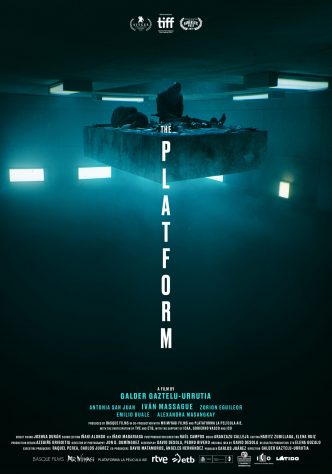 This Spanish language science fiction mindbender is in the tradition of Vincenzo Natali’s CUBE. Like that film, The Platform melds an imaginatively minimalistic premise with a transcendent intelligence, and also a social conscience, with wealth inequality (it’s been likened to a “Spanish PARASITE”), racism and collectivity all factoring into the film’s tightly contained but thematically rich narrative. The overriding theme is, simply, sustenance, a subject that has probably never been more forcefully or provocatively explored on film.
This Spanish language science fiction mindbender is in the tradition of Vincenzo Natali’s CUBE. Like that film, The Platform melds an imaginatively minimalistic premise with a transcendent intelligence, and also a social conscience, with wealth inequality (it’s been likened to a “Spanish PARASITE”), racism and collectivity all factoring into the film’s tightly contained but thematically rich narrative. The overriding theme is, simply, sustenance, a subject that has probably never been more forcefully or provocatively explored on film.
EL HOYO (which actually translates as THE HOLE) played the festival circuit in late 2019, to generally positive response (it won the People’s Choice award at TIFF’s Midnight Madness program), before being snatched up by Netflix—where it premiered on March 20, 2020.
It begins with the bookish Goreng, living in some unspecified dystopia, volunteering to be placed in a multi-level enclosure built around a vast hole. He finds himself in a nondescript, furniture-less cell on level 48 with the elderly Trimagasi, who explains how things work in the Hole.
Its most noteworthy feature, we learn, is a vast platform filled with gourmet food that descends from the top of the structure, leaving progressively less food for the inhabitants of the lower levels—which is an especially galling development since each month those inhabitants are moved to different floors, seemingly by random selection. For some reason the cells heat up whenever one of their charges attempts to keep a bit of food for him or herself, yet there’s no problem when Miharu, a young woman, periodically rides the food platform down from an upper level in search of her missing child.
Once Goreng’s first month in the Hole is up he and Trimagasi are transferred far down to level 171. There Goreng awakens to find that Trimagasi has tied him up; it seems that, as the food platform is always picked clean by the time it reaches this floor, Trimagasi is readying Goreng to be cannibalized.
He’s saved by Miharu, who rides the platform down and kills Trimagasi just as he’s about to devour Goreng. She leaves behind an increasingly maggot-ridden corpse from which Goreng, in the absence of any sustenance, has no choice but to partake. Yet like a twisted Obi-Wan Kenobi, Trimagasi’s spirit continues to appear to Goreng and offer pithy advice.
Goreng next awakens to find himself on level 33 with Imoguiri, a young woman, as his cellmate. She was part of the Hole’s administration, and like Goreng has volunteered to be placed in the Hole. She seeks, unsuccessfully, to foster a sense of community with the prisoners below them, imploring them to ration their portions of the food platform so the lower levels will have more to eat.
Eventually Imoguiri commits suicide and Goreng finds himself on a lower level, where he once again partakes of human flesh—hers, this time—and next finds himself on level six with a new cellmate: the irrepressible Baharat, a black man. These two elect to subvert the Hole’s hierarchy by riding the food platform down to the lowest level and distributing its contents themselves. This, needless to say, is far more difficult than anticipated.
I wish I could say the conclusion to THE PLATFORM was as strong as everything leading up to it, but that would be inaccurate. The final twenty minutes are exciting, and extremely violent, but fail to close things out on a satisfying or even coherent note. Nor are the narrative’s many loose ends ever tied up; we never come close to learning what the Hole truly is, nor the motives of the cooks who so lovingly prepare its daily banquets.
Beyond that the film can be faulted for its protagonist. As played by Ivan Massagué, Goreng is a pure-hearted nonentity, leaving a void at the film’s center as large as the hole of the title.
Vital Statistics
THE PLATFORM (EL HOYO)
Basque Films/Netflix
Director: Galder Gaztelu-Urrita
Producers: Ángeles Hernández, Carlos Juarez
Screenplay: David Desola, Pedro Rivero
Cinematography: Jon D. Dominguez
Editing: Elena Ruiz, Haritz Zubillaga
Cast: Ivan Massagué, Zorion Eguileor, Antonia San Juan, Emilio Buale, Alexandra Masangkay, Zihara Llana, Mario Pardo, Algis Arlauskas, Txubio Fernández, Eric L. Goode, Óscar Oliver
